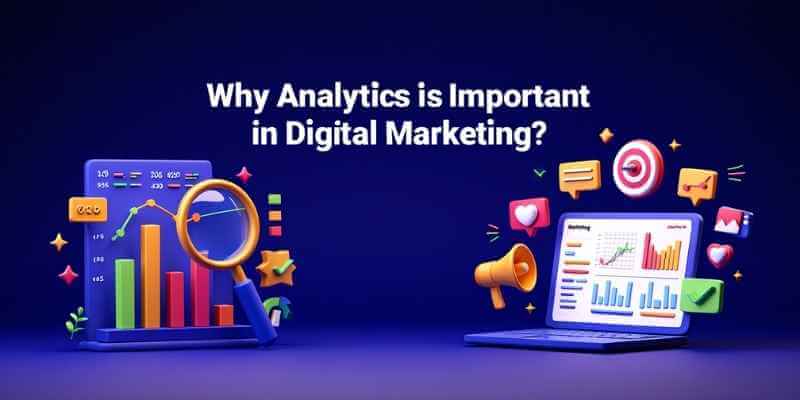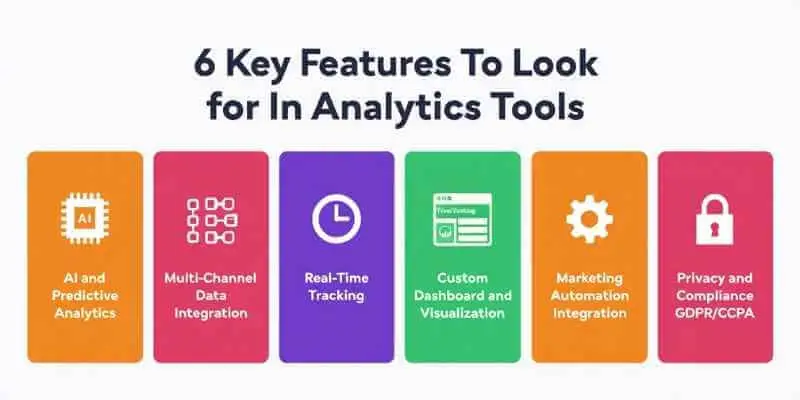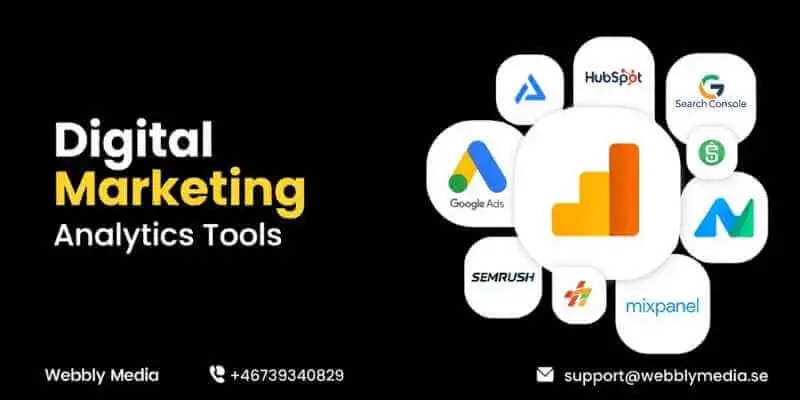Digital marketing is constantly evolving. Today, businesses use digital marketing analytics tools to monitor their performance. These tools help you see what’s really working in your campaigns. You can track audience behavior, traffic sources, return on investment (ROI), and conversions in real time. This knowledge helps you make better marketing decisions and grow your business effectively.
In this blog, we’ll look at the top 10 marketing analytics platforms that dominate the digital marketing landscape in 2025. These tools will still be valuable in 2026 and beyond. From free to paid options, let’s explore the tools that can take your digital marketing activities to the next level. By the end of this guide, you’ll be able to choose the right tool for your needs in just 10 minutes.
What Are Digital Marketing Analytics Tools?
Digital marketing analytics tools are software platforms that help you collect, measure, and analyze marketing data. These tools track how users interact with your website, ads, emails, and social media channels.
With these tools, you can find out which campaigns bring in the most visitors, leads, and sales. They also highlight what isn’t working well, so you can adjust your marketing strategy.
In short, these tools turn raw data into useful insights. This helps marketers make informed decisions to improve returns on investment, optimize content, and enhance customer experience.
Why Analytics Is Important In Digital Marketing?

According to HubSpot’s ”State of Marketing Report 2025,” businesses that use data-driven analytics in their marketing see 2.8 times higher ROI than those that do not. A study published by Deloitte found that companies using advanced marketing analytics grow their revenue 20% faster than those who rely only on gut feelings.
These data show that analytics is not just about reporting. It is crucial for a successful digital marketing strategy. Without insight, businesses are like operating without direction. Here are five reasons why analytics is important:
✔️ Measure Campaign Performance
✔️ Understand Customer Behavior
✔️ Optimize Marketing Activities
✔️ Predict Future Outcomes
✔️ Improve ROI
In summary, analytics is the foundation of a strong digital marketing plan. It helps businesses make smarter decisions, run better campaigns, and achieve long-term success.
How Tools Can Help In Digital Marketing Analytics
Marketing intelligence tools make analysis easier. They track website visitors, measure how well campaigns perform, and identify how audiences behave.
These tools make reporting simpler by showing data on clear dashboards and visualizations. This helps compare performance across different platforms like SEO, social media, and Google Ads or PPC, so you can quickly spot trends and make adjustments to improve results.
Additionally, analytics tools reveal useful insights, such as which keywords lead to conversions or which audience segments engage the most. In the end, they help you make decisions based on data, save time, and ensure your budget is spent on the right marketing channels.
Key Features To Look for In Analytics Tools

When choosing digital marketing analytics software, focus on tools that help you collect data easily, ensure accuracy, and support fast marketing decisions. Here are the main features to consider:
✅ AI and Predictive Analytics
AI can automatically analyze large amounts of data and predict future trends. It helps you understand how customers behave, forecast campaign results, and improve your return on investment with smart insights based on data.
✅ Multi-Channel Data Integration
Good tools combine data from SEO, social media, ads, and emails in one place. This complete view shows how all your marketing channels work together.
✅ Real-Time Tracking
Real-time analytics lets you see how your campaigns are performing instantly. You can quickly change your strategy if engagement drops or trends shift, saving time and improving results.
✅ Custom Dashboard and Visualization
Custom dashboards help you focus on what’s important. Visual reports make the data easy to understand and share. This helps your team to make quick, informed decisions.
✅ Marketing Automation Integration
When analytics tools link with automation tools, you can run smarter campaigns. For example, you can send personalized emails based on user behavior or automatically trigger ads when trends change.
✅ Privacy and Compliance (GDPR, CCPA, etc.)
A reliable analytics tool must follow privacy laws. It should protect user data, ensure transparency, and comply with global standards like GDPR and CCPA to build trust with your audience.
Top 10 Digital Marketing Analytics Tools To Consider
Choosing the right digital marketing analytics tools can be difficult because there are so many options. However, we’ve listed the top 10 tools that provide accurate data, insights, and opportunities for growth. Here they are:
1. Google Analytics 4 (GA4)
Google Analytics 4 is the latest version of Google’s analytics platform. It is basically a website analytics tool that is designed for modern and privacy-focused marketing. It helps track website and app performance using event-based data, giving deeper insights into user behavior and conversions.
✅ Key Features:
- Event-based tracking for detailed user actions
- Provides AI-generated predictions
- Enables tracking across devices and platforms
- Creates custom reports and visual data
- Integrates with Google Ads and Search Console
✅ Ideal For:
This tool is ideal for marketers, website owners, and eCommerce brands who want a strong, free way to track traffic, user journeys, and campaign performance in real-time.
✅ Integration Options:
It connects easily with Google Ads, Search Console, Tag Manager, and third-party platforms like HubSpot, Shopify, and WordPress. Its API also allows for custom integrations.
2. HubSpot Analytics
HubSpot Analytics is an all-in-one marketing analytics solution that helps you track website traffic, campaign results, and customer journeys all in one place. It is effective for inbound marketing and works well with CRM systems.
✅ HubSpot Marketing Analytics Features Include:
- Tracks website, email, and social media data on one dashboard
- Shows where leads come from and how they convert
- Provides advanced segmentation and funnel tracking
- Connects easily with HubSpot CRM
- Allows for easy report customization
✅ Ideal For:
This tool is perfect for businesses focused on inbound marketing, CRM campaigns, and customer journey tracking. It is especially useful for agencies and B2B companies that need a complete analytics solution.
✅ Integration Options:
It connects smoothly with Salesforce, Google Ads, LinkedIn, Facebook, and many other tools through HubSpot’s app marketplace and API.
3. SEMrush
SEMrush is a top-rated digital marketing analytics and SEO tool. It helps users understand keywords, check how their website is doing, watch what competitors are doing, and improve both paid and organic advertising.
✅ SEMrush Data Analytics Features Include:
- Analyze keywords and backlinks
- Track competitor performance
- Conduct site audits and check SEO health
- Monitor PPC campaigns
- Gain market insights and analyze trends
✅ Ideal For:
This tool is great for SEO professionals, digital marketers, and agencies that need in-depth analytics on keyword rankings, visibility, and competitor information.
✅ Integration Options:
SEMrush works with Google Analytics, Search Console, HubSpot, and popular content management systems like WordPress and Shopify.
4. Ahrefs
Ahrefs is an industry-leading SEO analytics tool. It helps marketers check their website’s authority, analyze competitors, and find new ways to rank better.
✅ Key Features of Ahrefs Insights Are:
- A strong database for checking backlinks and exploring sites
- Keyword research and tracking rankings
- Analysis of content gaps and competitor performance
- Technical SEO site audits
- Monitoring of search visibility and trends
✅ Ideal For:
This tool is great for SEO specialists, bloggers, and agencies that want to improve their search visibility and build links using accurate data.
✅ Integration Options:
Ahrefs works with Google Search Console and Looker Studio and offers API-based integrations for making reports and automating tasks.
5. Kissmetrics
Kissmetrics is a behavioral analytics platform that focuses on user actions, retention, and conversions. It provides insights into customer journeys and their value.
✅ Key Features:
- Tracks user actions and engagement
- Offers funnel visualization and cohort analysis
- Monitors revenue and conversion rates
- Provides tools for segmenting customers
- Tracks email campaigns
✅ Ideal For:
Kissmetrics is great for SaaS and eCommerce businesses that want to understand customer retention, user engagement, and product performance.
✅ Integration Options:
It easily connects with Shopify, WooCommerce, HubSpot, and email platforms like Mailchimp or Klaviyo.
6. Domo
Domo is a powerful business intelligence tool designed for large companies. It combines marketing, sales, and performance data into one interactive dashboard.
✅ Key Features:
- Cloud-based data analysis and visualization
- AI-powered data insights
- Real-time reports from multiple sources
- Mobile-friendly dashboards
- Custom automation options
✅ Ideal For:
Domo is great for large businesses that need a flexible analytics solution to connect data across different departments for better decision-making.
✅ Integration Options:
Domo connects with over 1,000 data sources, such as Google Analytics, Salesforce, HubSpot, and AWS, giving you a complete view of your business.
7. Hotjar
Hotjar helps marketers see how people use their websites. It offers tools like heatmaps, session recordings, and feedback options. The goal is to make the user experience better and boost conversions.
✅ Key Features:
- Heatmaps and session recordings
- On-site surveys and feedback tools
- Conversion funnel tracking
- Behavior analytics for understanding user experience
- Tracking of forms and clicks
✅ Ideal For:
This tool is useful for UX designers, website owners, and marketers who want to improve site performance with real user data.
✅ Integration Options:
Hotjar works with Google Analytics, HubSpot, Slack, and CMS platforms like WordPress and Webflow.
8. Whatagraph
Whatagraph makes marketing reporting simple by showing data from different sources in one dashboard. It helps agencies and teams save time with automatic report generation.
✅ Key Features of The Whatagraph Reporting Tool:
- Display data from multiple channels
- Automate report scheduling
- Use custom templates and branding
- Access real-time insights on campaign performance
- Create client-ready reports
✅ Ideal For:
This tool is great for agencies and marketing teams that handle multiple clients or channels and need quick, visual performance reports.
✅ Integration Options:
Whatagraph connects with Google Analytics, Facebook Ads, HubSpot, and over 40 other marketing platforms.
9. Mixpanel
Mixpanel is especially great for product and user behaviour analytics. It helps businesses see how customers use apps and digital products. Its main focus is on improving user retention and journeys.
✅ Key Features:
- Tracks user actions with events
- Analyzes retention and user funnels
- Offers advanced user segmentation
- Provides real-time dashboards
- Uses AI for predictive insights
✅ Ideal For:
It is best for SaaS companies, app developers, and tech startups that want to understand user behavior and improve product growth.
✅ Integration Options:
Mixpanel easily connects with Segment, HubSpot, Salesforce, and other product management tools.
10. Supermetrics
Supermetrics helps you gather and report data from different marketing channels in one location. It is popular with marketers who rely on data for their decisions.
✅ Key Features of The Supermetrics Data Connector Tool:
- Connects to over 80 marketing platforms
- Automatically exports data to Google Sheets or Data Studio
- Provides real-time updates and scheduling options
- Tracks and shows key performance indicators (KPIs)
- Makes sharing reports easy
✅ Ideal For:
This tool is best for agencies and data analysts who run campaigns across various channels and need quick, accurate, and automated reports.
✅ Integration Options:
Supermetrics works with Google Sheets, Excel, BigQuery, Looker Studio, and major ad platforms like Facebook, Google Ads, and LinkedIn Ads.
Comparison Table: Best Features at a Glance
Tool | Best For | Unique Feature | Cost |
GA4 | Web & app tracking | Predictive analytics | Free |
HubSpot | CRM integration | Funnel ROI tracking | Paid |
SEMrush | SEO & PPC | Competitor data | Paid |
Ahrefs | Backlinks | Content explorer | Paid |
Kissmetrics | SaaS analytics | Cohort analysis | Paid |
Domo | Enterprises | BI dashboards | Paid |
Hotjar | UX optimization | Heatmaps | Freemium |
Whatagraph | Reporting | White-label reports | Paid |
Mixpanel | User retention | Real-time events | Paid |
Supermetrics | Reporting automation | Data connectors | Paid |
How to Choose the Right Tool for Your Business
Choosing the right tool depends on what your business wants to achieve, your marketing setup, and your budget. Follow these steps to find the best tools:
1️⃣ Identify Your Goals (Traffic, Sales, Retention)
Decide what you want to accomplish with analytics. Are you interested in tracking website visitors, sales conversions, or keeping customers? Having clear goals will help you narrow down your options.
2️⃣ Match the Tool to Its Purpose
Different tools are best for different tasks. For instance, use GA4 for website analytics, Mixpanel for understanding user behavior, and SEMrush for SEO performance.
3️⃣ Consider Your Budget and Growth
Some tools have free versions, while others require a subscription. Think about how long you will use the tool and if it can grow with your business.
4️⃣Check Integration with Marketing Channels
Choose tools that easily connect with your digital marketing channels. This helps you collect better data and insights across your marketing activities.
Contact Webbly Media For Expert Help

If you find this process difficult, contact Webbly Media. We are a top digital marketing agency in Sweden, serving businesses in Stockholm, Uppsala, Malmö, Gothenburg, and across the country.
We integrate digital marketing tools and build custom dashboards for you. This gives you clear insights and measurable results. Let our experts support your marketing success.
➤ Why Choose Us:
- 7+ years of proven experience
- 5-star digital marketing services
- 24/7 online support, serving nationwide
- Affordable and transparent pricing
- Customer-friendly behavior
- 100% Satisfaction Guarantee
Check us out on Google and call us today to solve your marketing challenges.
Frequently Asked Questions
Digital marketing analytics tools help measure different parts of online marketing. They can be grouped into five main types:
- Web analytics
- Social media analytics
- SEO analytics
- PPC/campaign analytics
- Multi-channel dashboards
Each type targets a specific area of digital marketing measurement.
Website analytics platforms collect and analyze visitor data using tracking codes on your site. They provide insights into user behavior, traffic sources, and conversions, helping businesses make informed decisions.
When using marketing analytics software, consider these data privacy tips:
- Ensure compliance with laws like GDPR and CCPA
- Confirm user data is anonymized or collected with consent
- Update your privacy policy to reflect your analytics usage.
Digital marketing measurement tools assess how well campaigns perform by analyzing metrics such as leads, conversions, and ROI. Analytics tools, on the other hand, identify why those results occur.
Common mistakes include incorrect tracking setups, ignoring multi-channel attribution, misinterpreting data, and not acting on insights. Regular audits and continuous learning can enhance the effectiveness of your analytics tools.
Campaign performance analysis tools provide insights into marketing effectiveness by tracking KPIs like CTR and CPA. Analyzing these metrics helps identify high-performing campaigns, reduce spending, and improve ROI.








